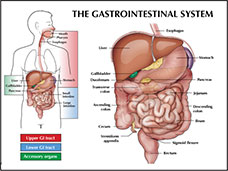The digestive system is an intricate system that can be disrupted by disease, diet and emotional stress. While some digestive problems can be remedied with medicine and lifestyle changes, others require surgery. AnMed Health physicians use cutting edge technology, such as gastrointestinal ultrasound, to diagnose and treat digestive conditions. Gastrointestinal ultrasound provides more detailed images of the digestive system than other imaging studies. It allows physicians to examine your esophageal and stomach linings, as well as your upper and lower digestive tract.
The primary role of the digestive system is to help the body break down and absorb food. Also known as the gastrointestinal (GI) tract, it includes the mouth, esophagus, stomach, small intestine, large intestine — also called the colon — rectum, and anus. Tiny glands in the mouth, stomach, and small intestine produce juices to help digest food. The digestive system also contains a layer of smooth muscle that moves food along the tract.
Using minimally invasive techniques, AnMed Health surgeons are experts in treating a variety of GI problems including:

Sometimes called acid reflux or heartburn, GERD is a condition where stomach acids reflux or "back up" from the stomach into the esophagus. People often describe heartburn as a harsh, burning sensation. Transoral Incisionless Fundoplication (TIF) is an incision-less procedure for treating people with acid reflux disease. Using a special device, the surgeon reconstructs the anti-reflux valve at the entrance of the esophagus into the stomach to prevent reflux. TIF represents the latest step in the treatment of acid reflux disease.
The Division of GI Surgery is dedicated to providing comprehensive surgical care for patients with basic and complex gastrointestinal diseases. Patients are referred to our surgeons from across the Southeastern United States for management of a variety of benign and malignant GI disorders via open and laparoscopic approaches, including:
Copyright ©2021 Prof. Gautam Chattopadhyay || All Rights Reserved || Design & Development By Kolkata Infotech Solution